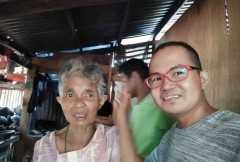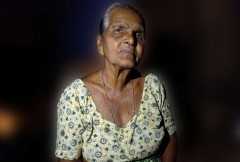

There are millions of Marcianas bringing up children of overseas workers in the true faith

My prayer book and rosary are my weapons in times of joy and sorrow, says Mary Hariyat a Catholic mother
For more than a decade now, Benedette Marang Ji Grawng has been living in a crowded camp for displaced people in conflict-torn Myanmar.
With each passing day, simple life becomes even more difficult to endure with increasing challenges and hardships, but that hasn’t diminished her faith, says Ji Grawng, a Catholic mother.
“The more difficulties I face, the deeper and stronger my faith becomes. I believe in God who fulfills all our prayers,” says the slightly built 43-year-old Kachin mother of three.
In the midst of her busy daily schedule involving cleaning, cooking, sewing clothes and taking care of a three-year-old child, the devout Catholic finds time to share teachings from the Bible with her two teenage children, aged 16 and 18.

Ji Grawng is seen before a make-shift house in the St.Paul's Ja Mai Kaung IDP camp run by the Catholic Church on the outskirts of Myitkyina, Kachin state's capital city. (Photo supplied)
“I also send my children to catechism and Bible classes,” Ji Grawng told UCA News. “My children are obedient and I am proud to be their mother.”
She lives with her three children and husband, Paul Magi Seng Awng, in a tiny 81 square foot (7.5 sq meter) room in the Catholic Church-run St. Paul Ja Maing Kaung camp for internally displaced persons (IDPs).
The camp housing 200 people, most of them forced to flee their homes in 2011, is run by Karuna, a local branch of Catholic charity, Caritas, and is located close to the Kachin state capital of Myitkyina.
Whenever she goes to the church for Sunday Mass, Ji Grawng is accompanied by her family. She insists her children say a prayer inside the church or the rosary at the Marian grotto.
“I never pray to God to become rich,” says the mother who dreams of a life outside the cold confines of the IDP camp. “I dream of a healthy, happy and devout family like that of Joseph, Mary and Jesus.”
The St. Paul Church they attend is made from bricks and tiles and can accommodate around 150 parishioners. Catholics from the camp volunteer to keep it spic and span as they are regulars here with local residents.

Elderly women, the neighbors of Ji Grawng are seen in the St.Paul's Ja Mai Kaung IDP camp run by the Catholic Church on the outskirts of Myitkyina, Kachin state's capital city. (Photo supplied)
Ji Grawng recalls how one day her son, Stephen Seng Hkum, asked her: “Anu [mother in the Kachin language], why are we in this camp? Is it due to bad luck? Why can’t we move freely like other people?”
“My son, life is a mix of good and bad things and we need to cope with it with a brace face, whatever be the difficulties,” she replied to him gently. “It is important to depend on God and not to lose faith as we can’t do anything without Him.”
Ji Grawng also taught her children the importance of keeping on trying with a deep faith in God.
Her 16-year-old son, a high school student, nodded his head and told his mother that “I’ll keep your words and try hard in my life.”
Cecilia Seng Nu Tawng, her 18-year-old daughter, says she helps her mother with household chores, while also sewing clothes and taking care of her youngest sibling.
“It’s a happy time and filled with some peace of mind whenever we go to the Church together and also have a family dinner,” Nu Tawng added.
She acknowledges how the huge moral and physical support from her mother helps each one in the family to overcome the daily disappointments of staying in a camp for the displaced.
“My mother tells me not to lose hope and keep going on with my daily life. She also encourages me to learn sewing and make a professional career out of it,” Nu Tawng told UCA News.
“I also tell my children how to interact with people from other faiths,” says Ji Grawng who remains very concerned about their future.

Mothers with their children are seen in the St.Paul's Ja Mai Kaung IDP camp run by the Catholic Church on the outskirts of Myitkyina. (Photo supplied)
Life in the village and camp
Her own life as an ethnic Kachin woman was spent in hardship, first in her village and later in the camp.
Ji Grawng recalled her earlier life in Naugu, a remote village in Wai Maw Township fondly. Her husband's family grew seasonal fruit and farmed for a living. But the place lacked development; there were no proper roads or other such modern facilities.
The village is now under the control of the Kachin Independence Army (KIA). The 500 Baptists were the majority in the village which had about 200 Catholics. But they lived together peacefully.
A Catholic priest would visit the village once a year. Otherwise, it was the catechist who held regular prayers and even officiated at funerals, according to Ji Grawng.
“We would baptize children whenever the priest came, which would be around Christmas or Easter,” she said.
But it’s different since they escaped here to the camp. They attend church services every Sunday and also meet with priests more regularly.
But what hurts is that they have to depend on the generosity of others for their daily food. “It is not possible to grow seasonal fruit here,” Ji Grawng said. “For extra income, my husband works as a mason at nearby construction sites.”

Young people play the violin before a Sunday Mass in the St.Paul Church in the IDP camp. (Photo supplied)
Benedett Bauk Lu, one of the Catholic community leaders in Jai Maing Kaung ward, located on the outskirts of Myitkyina, said the community is not much affected by fighting as it’s a relatively peaceful region where Catholics and Baptists have lived side by side.
She said people from the camp were now members of the local community as they had lived there for more than a decade now and were actively involved in church activities.
In the predominantly Baptist area, a majority of the residents are ethnic Kachins and mostly worked as daily wagers on farms, growing paddy and corn. Only a few were employed by the government.
Catholics and Baptists get along well and occasionally hold common prayers in their homes, says Bauk Lu.
But the rampant use of drugs remains a big challenge in the community where most young people, including Catholics, use methamphetamine while some adults are addicted to heroin.
“The situation is worsening as drugs are easily available. There is a total lack of law and order in the area,” she added.

Women saying the rosary in the Marian month of May in the St.Paul Church at the IDP camp. (Photo supplied)
Saving money to meet the pope
Ji Grawng was as excited as the others when she first heard the news about Pope Francis' visit to Myanmar in November 2017.
“I was very eager to go to Yangon and attend the pope’s Mass, and see him personally rather than watching him on the news and photos,” she said.
However, raising the traveling expense was a big challenge for her. She told her husband who assured her he would try to save enough money from his work for her trip to Yangon.
“I actually got the chance to go to Yangon and took part in welcoming Pope Francis and attend the Mass celebrated by the pope,” she recalled with excitement.
Pope Francis visited Myanmar from Nov. 27-29, 2017, praying for peace in the conflict-torn country. The Southeast Asian nation’s 700,000 Catholics are a small minority in the Buddhist majority nation of 54 million people.

Catholic volunteers conduct Covid-19 tests at St.Paul's Ja Mai Kaung camp in August 2021. (Photo supplied)
Ji Grawng is originally a Catholic from Myitkyina town. She settled in her remote village to serve as a volunteer teacher in 2001 after failing to pass a matriculation exam.
Her parents were farmers and couldn’t afford to further her studies. “I took the lead in religious and social activities in the village. I also helped build the primary school building,” she said.
In 2002, Ji Grawng married a Chinese Baptist from the village she was serving in, only to have her Catholic faith put to the test.
Her in-laws along with the Baptist villagers tried to convert her.
“I explained to the village leaders that I can’t convert as I have already received Communion and Confirmation as a Catholic,” said Ji Grawng.
Fortunately, they understood and let her be. But another challenge came her way when she gave birth to her daughter. Her in-laws wanted the eldest child to practice the traditional rituals of worshiping Nats (god-like spirits venerated in Myanmar).
“I didn't quarrel or fight with my in-laws and other relatives but won them over with great patience,” she said.
Ji Grawng did not even try to persuade her husband to become a Catholic. He would often accompany her to church on festive days like Christmas and Easter, and quiz her about her faith.
So she introduced him to the local catechist and after learning about the faith he converted to Catholicism in 2004.

An elderly man in the St. Paul's Ja Maing Kaung IDP camp. (Photo: ucanews.com)
A volunteer in the IDP camp
Ji Grawng was seven months pregnant when she was forced to flee with her family when fighting began near their village in June 2011.
After staying in the jungle for three days, they managed to reach Myitkyina with the help of Kachin rebels. Three months later, they moved to St. Paul camp.
“While moving here, I got swept away while crossing a stream. I was saved by some people, but suffered a miscarriage.”
Ji Grawng says the prospect of her family and others in the camp returning home looks remote at present.
“Going home is full of risks as the area is riddled with landmines,” she said. “We don’t have any other option and may even have to move into a new settlement in case local authorities force us to leave the camp or close it down.”

A woman cuts cloth for sewing in the St. Paul's Ja Maing Kaung IDP camp. (Photo: ucanews.com)
On top of the everyday challenges and hardships of living in the crowded camp, the Covid-19 virus has brought further hardship.
Restrictions on travel and movement caused serious food shortages and decreased opportunities for people in the camp to earn an income. Access to the camp was restricted making it difficult to get essential humanitarian support.
Kachin IDPs like Ji Grawng have their hopes pinned on democracy returning to the troubled nation once again.

Ji Grawng is seen here sewing inside the small room where her family stays in the St. Paul's Ja Maing Kaung IDP camp. (Photo supplied)
Aung San Suu Kyi’s government had planned to carry out a resettlement program for the displaced people, but last February's military coup shattered those hopes.
It is her faith that has sustained Ji Grawng through all the troubles that would've left ordinary people overwhelmed. She hopes her prayers will deliver her family safely through the internal conflicts that have ravaged Myanmar for decades.